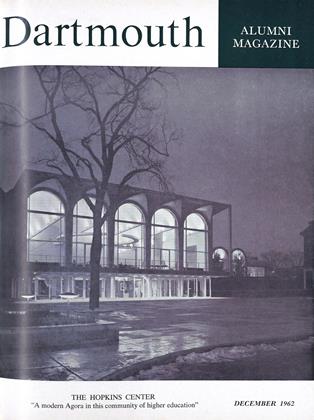INTERNATIONAL cooperation and exchange at the student level is being boosted by a fast-growing organization recently established in Hanover. This organization is the Dartmouth Committee of AIESEC - U.S. (Association Internationale des Etudiants en Sciences, Economiques, et Commerciales).
AIESEC is an international organization of business students. It sponsors a unique training program which gives American and foreign students of business and economics the opportunity to improve their knowledge of actual business operations in each other's countries through a reciprocal exchange of training positions.
The purpose of AIESEC is both pragmatic and idealistic. Dartmouth students, undergraduates as well as Tuck School men, were originally attracted by the opportunity of spending a summer with a European firm, thus combining classroom business training with the study of international economics and foreign affairs. However, more far-reaching benefits have become apparent since the first beginnings of AIESEC at Dartmouth three years ago. As reports have come in from American firms which accepted foreign trainees through the Dartmouth Committee, the members of AIESEC - Dartmouth have begun to realize what a fine opportunity is also being offered to American business. Almost without exception, these reports have been enthusiastic, and most of the firms have expressed the desire to continue in the program with AIESEC - Dartmouth.
To the many internationally minded students at Dartmouth, this program is, indeed, exciting. Yet it is only this year that AIESEC - Dartmouth is beginning to acquire status as an important campus activity. Many factors account for this. In the past three years, the correspondence, solicitation, and general coordination were handled by one student, and the number of participants was generally small. For most students, the decisive incentive to participate in AIESEC has been the prospect of a European traineeship. However, in order to obtain such a position, the Dartmouth committee must arrange a position in America for a European trainee. The arrangement of these home traineeships is an involved process, requiring coordinated teamwork if it is to be done on a large scale. Trainees must be of a high caliber in order to qualify. These factors deter apathetic students from the program, but they insure high quality in American trainees; inevitably, they also reduce participation in the program.
In the past, traineeships abroad were awarded to men who, having been found qualified for a foreign position, were able to raise a traineeship in the U.S. to be traded for a foreign position at the annual International Congress of AIESEC. Last year, for instance, Dartmouth sent nine students abroad: they were Roger P. Parkinson '63, Spain; David W. Ward '62, Turkey; James S. Hughes '64, Spain; Eric G. Dalrymple '62, Spain; William J. McDonald '62, France; Jerome H. Bentley III '62, Germany; Ronald J. Fraboni '63, Italy; John M. Van Horn GT, Germany; and Dennis A. Eagle '63, France. These men all relied on personal contacts in arranging matching traineeships in this country. Such a policy is far from ideal, but it is the only practical one for an incipient AIESEC committee. This year, however, AIESEC — Dartmouth is embarking on a campaign to raise traineeships in a more business-like and less personal manner.
This new policy is designed to make AIESEC opportunities available to highly qualified Dartmouth students who do not have close personal contacts with highranking business personnel. As part of it, AIESEC - Dartmouth plans this year to increase emphasis on solicitation of concerns in Vermont and New Hampshire.
Also, the Dartmouth committee plans to contact alumni outside its two-state priority region. (Since there are 43 local committees in the country, the national office of AIESEC - U.S. has allotted to each committee an area within which it may solicit traineeships, and the committee
may not approach companies outside its area without prior consultation with the other committees involved.) Personal contacts outside one's area are always honored and alumni are considered "personal contacts." Since the industrial complex of New Hampshire and Vermont offers limited opportunities for business traineeships of the quality required by AIESEC, the Dartmouth committee hopes to arouse interest and support among alumni outside its area of jurisdiction. Most of the AIESEC - U.S. committees are now concentrated in the Northeast. There are large industrial areas in other sections of the nation which so far have been virtually untouched by AIESEC.
The Dartmouth committee has members from different parts of the country, and plans are being made to approach alumni in the home regions of these members. Heading the committee as president is Walter H. Lillard III '64 of Sharon, Mass. Other members are Lockwood C. Barr '64 of Dedham, Mass.; Michael F. Buckley '65 of Saranac Lake, N. Y.; Ronald J. Fraboni '63 of Watkins Glen, N. Y.; Roger P. Parkinson '63 of Chevy Chase, Md.; Michael H. Simonson '64 of Rye, N. Y.; and William J. Teska '64 of Excelsior, Minn.
Those wanting more information should address correspondence to Walter H. Lillard III, President, AIESEC - Dartmouth, Cutter Hall, Hanover, N. H.
Working for foreign firms last summer under the AIESEC program were (standing,l to r) Roger Parkinson '63, Eric Dalrymple '62, James Hughes '64 David Ward.'62- (kneeling) Ronald Fraboni '63, Jerome Bentley '62, and Bill McDonald 63.














